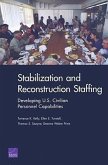The end of the Cold War brought widespread optimism about the future of civil-military relations. But as Michael Desch argues in this thought-provoking challenge to Harold Lasswell's famous "garrison state" thesis, the truth is that civilian authorities have not been able to exert greater control over military policies and decision making. In wartime, civil authorities cannot help but pay close attention to military matters. In times of peace, however, civilian leaders are "less" interested in military affairs--and therefore often surrender them to the military. Focusing on a wide range of times and places, Desch begins with a look at changes in U.S. civil-military relations since the end of the Cold War. He then turns to the former Soviet Union, explaining why it was easier for civilians to control the Soviet military than its present-day Russian successor. He examines the Hindenburg-Ludendorff dictatorship in World War I Germany, Japan during the interwar era, and France's role in the Algerian crisis. Finally, he explores the changing domestic security environment and civil-military relations in South America.
Hinweis: Dieser Artikel kann nur an eine deutsche Lieferadresse ausgeliefert werden.
Hinweis: Dieser Artikel kann nur an eine deutsche Lieferadresse ausgeliefert werden.








